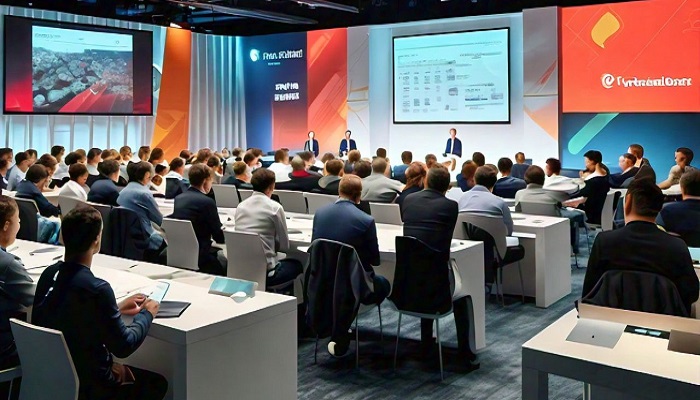Business
Trends Shaping the Future of the Events Tech Industry

- The events tech industry is evolving with trends like hybrid events, data-driven personalization, AI and automation, and sustainability, enhancing experiences and efficiency.
- Key advancements include seamless integration of virtual and physical elements, personalized attendee interactions, streamlined management through AI, and eco-friendly practices.
The event tech sector is experiencing a major change, fueled by fast technological advances and evolving attendance expectations. Four new trends are emerging in the near future, which will alter the way events are planned, experienced, and evaluated.
Hybrid Events: Bridging the Physical and Virtual Worlds
The flu epidemic has led to the rise of virtual gatherings. However, since in-person gatherings are making their return, hybrid events are becoming an everyday thing. Hybrid events combine two worlds, giving attendees the option to participate either physically or virtually. Hybrid-based events don’t just improve accessibility; they also broaden their reach and allow the organizers to connect with an international audience.
The key takeaway: Consider investing in robust hybrid platforms for events that seamlessly combine virtual and live elements, providing a welcoming and enjoyable experience for every attendee.
Hybrid events can also provide the possibility of creating innovative formats and engaging interactive events. Virtual participants can take part in interactive polls or Q&A discussions, as well as social lounges. In-person attendees benefit from digital enhancements, such as augmented reality (AR) and real-time updates through event apps. The fusion of physical and digital elements makes for a better, more engaging event experience.
Data-Driven Personalization: Enhancing Attendee Experience
Data analytics are vital in enhancing attendees’ experiences. Utilizing data gathered through registration forms, online interaction, and event apps, organizers gain invaluable information about attendees’ preferences and behaviors. These data points can be used to customize the content, networking opportunities, and even the event experience to suit specific needs.
The key takeaway: Using advanced data analysis tools to analyze and collect data on attendees allows you to build personalized experiences that resonate with the people you want to reach.
The concept of personalization goes beyond the content or schedules. It covers every step in an attendee’s journey, from personalized invitations and targeted marketing campaigns to bespoke agendas and follow-ups after the event. By analyzing and anticipating attendees’ demands, event planners will be able to deliver an engaging and unforgettable event.
AI and Automation: Streamlining Event Management
Artificial Intelligence (AI) and automation are revolutionizing event management by streamlining processes and increasing effectiveness. AI-powered chatbots can respond to attendees’ inquiries quickly, and automation tools can handle tasks like event scheduling, ticketing, and subsequent communications. This technology frees organizers to concentrate on more valuable activities like strategy and innovation.
The key takeaway: Apply AI and automation technologies for event management to streamline processes, reduce manual work and increase the overall effectiveness.
AI could also improve attendance engagement by providing personalized suggestions and content curation. In particular, AI algorithms can suggest exhibitions, sessions, and networking options based on participants’ preferences and previous behavior. Furthermore, automated tools can create detailed analyses and reports that provide organizers with concrete information to help improve the future of gatherings.
Sustainability: Prioritizing Eco-Friendly Practices
Sustainability has become a trendy term but is now a vital aspect of events. Attendees are becoming increasingly concerned about green practices, and event organizers are responding with green strategies. These include reducing resource consumption, using sustainable energy sources, and promoting virtual attendance to reduce carbon footprints.
The key takeaway: Is to Incorporate sustainable methods into the planning and execution of your event. This will show your dedication to sustainability and attract eco-conscious guests.
The practices of sustainable events range from simple steps like removing single-use plastics and utilizing digital instead of printed materials to more extensive initiatives, such as carbon offsets and environmentally friendly venues. Sustainability is not just good for the environment; it also improves the reputation of the brand and attracts an increasing number of eco-concerned customers.
Additional Insights
Enhanced Networking Opportunities
Networking is an essential element of every successful event, and technological advances are enabling attendees to interact and work together. Hybrid or virtual events offer unique networking tools that include AI-powered matchmaking, electronic business card swaps, and interactive breakout rooms. These solutions allow for meaningful connections and create a feeling of community between attendees, regardless of where they are.
Immersive Technologies: VR and AR
Virtual Reality (VR) and Augmented Reality (AR) are growing in popularity within the event sector, offering thrilling experiences that draw viewers. VR transports guests to virtual worlds that allow for product demonstrations with interactive elements or virtual tours. AR enhances physical spaces by overlaying digital images, providing more information or interactive features. These tools not only entertain guests but also deliver lasting and powerful experiences.
Cybersecurity: Protecting Attendee Data
Since events have become increasingly tech-driven, cybersecurity has become a major issue. The security of attendee information and the security of online interactions is essential. Event planners should prioritize security methods, like security measures, encryption, secure payment gateways, and strong data security policies, to ensure trust and protect important information.
Looking Forward
The growth of the events technology industry is a continuous process driven by the need for innovation and the desire to deliver extraordinary events. By embracing developments and keeping up-to-date with new technologies, event managers can navigate the current event environment and create experiences that are both efficient and transformational.
While the business continues to change, being aware and able to adapt is essential for success in this ever-changing market. Through hybrid models for customized events, AI-driven efficiency, or sustainable strategies, the future of event management is exciting, bright, and filled with potential.
Take advantage of these trends to help you enhance your events and ensure their relevance and effectiveness within an ever-changing environment. The future for the event tech sector is promising, and those who are able to change will set the standard by delivering unforgettable experiences.

















































